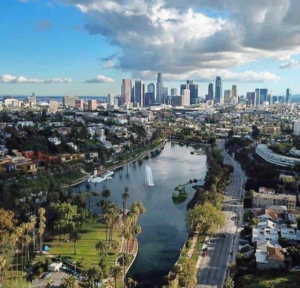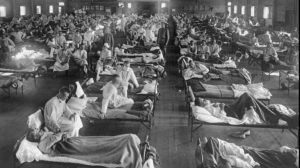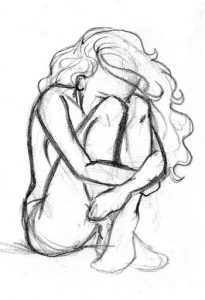Prepare for the Gaslight
April 11, 2020LA’s clear air during mandated shelter-in-place.
MEDIUM/FORGE
Prepare for the Ultimate Gaslighting*
You are not crazy, my friends
Gaslighting, if you don’t know the word, is defined as manipulation into doubting your own sanity; as in, Carl made Mary think she was crazy, even though she clearly caught him cheating. He gaslit her.
Pretty soon, as the country begins to figure out how we “open back up” and move forward, very powerful forces will try to convince us all to get back to normal. (That never happened. What are you talking about?) Billions of dollars will be spent on advertising, messaging, and television and media content to make you feel comfortable again. It will come in the traditional forms — a billboard here, a hundred commercials there — and in new-media forms: a 2020–2021 generation of memes to remind you that what you want again is normalcy. In truth, you want the feeling of normalcy, and we all want it. We want desperately to feel good again, to get back to the routines of life, to not lie in bed at night wondering how we’re going to afford our rent and bills, to not wake to an endless scroll of human tragedy on our phones, to have a cup of perfectly brewed coffee, and simply leave the house for work. The need for comfort will be real, and it will be strong. And every brand in America will come to your rescue, dear consumer, to help take away that darkness and get life back to the way it was before the crisis. I urge you to be well aware of what is coming.
What the trauma has shown us, though, cannot be unseen.
A carless Los Angeles has clear blue skies as pollution has simply stopped. In a quiet New York, you can hear the birds chirp in the middle of Madison Avenue. Coyotes have been spotted on the Golden Gate Bridge. These are the postcard images of what the world might be like if we could find a way to have a less deadly daily effect on the planet.
What’s not fit for a postcard are the other scenes we have witnessed: a health care system that cannot provide basic protective equipment for its frontline; small businesses — and very large ones — that do not have enough cash to pay their rent or workers, sending over 16 million people to seek unemployment benefits; a government that has so severely damaged the credibility of our media that 300 million people don’t know who to listen to for basic facts that can save their lives.
The greatest misconception among us, which causes deep and painful social and political tension every day in this country, is that we somehow don’t care about each other. White people don’t care about the problems of black America. Men don’t care about women’s rights. Cops don’t care about the communities they serve. Humans don’t care about the environment. These couldn’t be further from the truth. We do care. We just don’t have the time to do anything about it. Maybe that’s just me. But maybe it’s you, too.
And so the onslaught is coming. Get ready, my friends. What is about to be unleashed on American society will be the greatest campaign ever created to get you to feel normal again. It will come from brands, it will come from government, it will even come from each other, and it will come from the left and from the right. We will do anything, spend anything, believe anything, just so we can take away how horribly uncomfortable all of this feels. And on top of that, just to turn the screw that much more, will be the one effort that’s even greater: the all-out blitz to make you believe you never saw what you saw. The air wasn’t really cleaner; those images were fake. The hospitals weren’t really a war zone; those stories were hyperbole. The numbers were not that high; the press is lying. You didn’t see people in masks standing in the rain risking their lives to vote. Not in America. You didn’t see the leader of the free world push an unproven miracle drug like a late-night infomercial salesman. That was a crisis update. You didn’t see homeless people dead on the street. You didn’t see inequality. You didn’t see indifference. You didn’t see utter failure of leadership and systems.
From one citizen to another, I beg of you: Take a deep breath, ignore the deafening noise, and think deeply about what you want to put back into your life. This is our chance to define a new version of normal, a rare and truly sacred (yes, sacred) opportunity to get rid of the bullshit and to only bring back what works for us, what makes our lives richer, what makes our kids happier, what makes us truly proud.
Full read:
https://forge.medium.com/prepare-for-the-ultimate-gaslighting-6a8ce3f0a0e0
Reverberations Into the Future
The Paris Review
How Pandemics Seep into Literature
‘The literature that arose from the influenza pandemic speaks to our current moment in profound ways, offering connections in precisely the realms where art excels: in emotional landscapes, in the ways a past moment reverberates into the present, in the ineffable conversation between the body’s experiences and our perception of the world.
Right now, every few days brings another reality into focus; what seemed far-fetched yesterday arrives tomorrow. The past is always another country, but the speed at which knowledge becomes outdated, naivete turns to realization, and basic truths change is dizzying during a pandemic.
One’s reality doesn’t simply shift in a pandemic; it becomes radically uncertain—indeed, uncertainty is the reality. The unpredictability of the COVID-19 virus and all we don’t know about it means we have no idea where we are in the story or even what story we are in. Is this the first wave of something even deadlier to come? Have we reached the top of the curve? What’s the scope of the tragedy? Is the economy the real story? What do we think we know now that may prove fatally wrong? The narrative uncertainty causes many of us to turn to genre fiction and predictable movies (even if they are about disaster)—they allow us to pull down another story like a shade and sit in a place where we already know the ending.
And finally, there comes the aftermath, both for our bodies and for our culture. How do such experiences live on in the cells, in the memory, in the streets? The continued sense of living death, of an experience that marks us with its shadow, echoes even after a pandemic passes. Woolf’s Mrs. Dalloway, so often read as a novel capturing the aftermath of war—which it most certainly does—also records in its title character the physical and mental exhaustion that lingers after an illness. Like Woolf, Clarissa Dalloway has heart damage from her encounter with influenza, and as she moves through the streets of London and at home, she sees her world through her sense of bodily vulnerability, her very heartbeat and its lags pulsing through the memories of her illness. The sights and sounds and smells of the sickroom float back through her consciousness, shifting the ways she perceives the London day. Whether in illness or in observation, our own bodies are busy now. They are recording our pandemic, setting in place the reverberations that will echo into our future.’
Full read:
Alone with the unfamiliar…
Anything that removes what grows between our hearts and the day is spiritual. The aim of all spiritual paths, no matter their origin or the rigors of their practice, is to help us live more fully in the lives we are given. [Parker Palmer] The life of spirit is everywhere: in in dust waiting for light, in music waiting to be heard, in the sensations of the day waiting to be felt. Beings spiritual is much more useful and immediate than the books about books would have us think.
-Mark Nepo
Pure logic is the ruin of the spirit.
-Antoine de Saint-Exupéry
Creativity requires serendipity and a playful, receptive spirit. Let yourself go when you are trying to invent something new.
-Alexander Stoddard
Because we are alone with the unfamiliar presence that has entered us, because we feel momentarily abandoned by what we’ve believe and grown accustomed to; because we can’t keep standing as the ground shifts under our feet. That is why the sadness passes over like a wave. The new presence inside us, that which has come to us, has entered our heart, has found its way to its innermost chamber, and is no longer even there…it is already in our blood.
And we don’t know what it was. We could easily be persuaded that nothing happened, and yet something has changed inside us, as a house changes when a guest comes into it. We cannot say who has entered, we may never know, but there are many indications that the future enter us in just this way, to transform itself within us long before it happens.
That is why it is so important to be alone and attentive when you are sad: because the seemingly uneventful and motionless moment when our future steps into us is so much closer to life than any loud and accidental point of time which occurs, as it were, from the outside.
-Rilke



